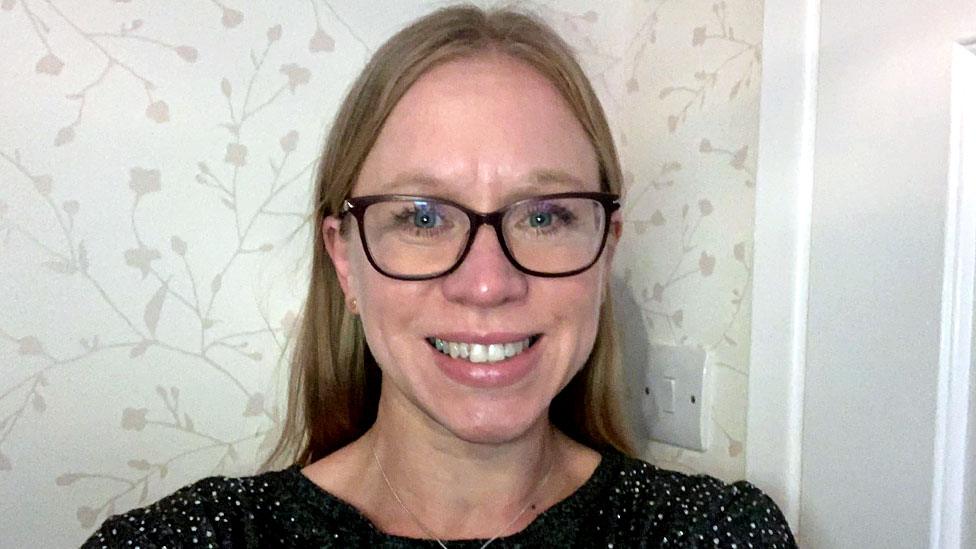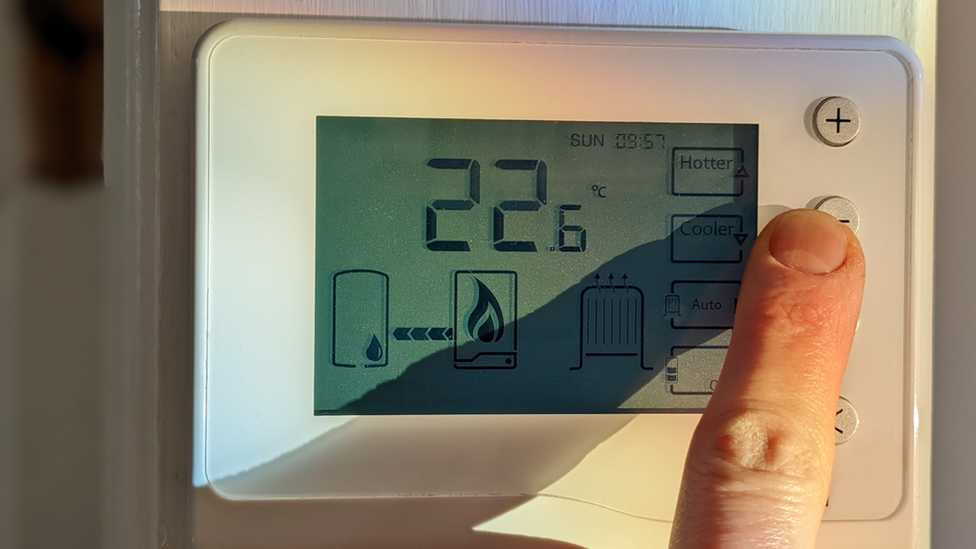Energy bills: 'We cut back but are paying three times as much'
- Published

Amy Appleyard had been paying £136 a month to heat and light her home.
Knowing that energy bills would rise in the autumn, she and her family had cut back on how much power they were using.
But they were shocked to be told that their monthly direct debit would rise more than three times to £442.
They are just one of many UK households who have cut back on energy but are still being charged higher direct debits. But suppliers say bills have to reflect soaring energy prices.
It comes after Business Secretary Grant Shapps wrote to energy firms asking them to ensure bills reflected the amount of energy customers were using, and not to over-estimate charges.
Mrs Appleyard, her husband Mike and eight-year-old daughter Kathryn, faced the huge hike in direct debit energy payments despite cutting back at their three-bedroom home in Greater Manchester.
"We've all become a bit more obsessive about turning off lights or unplugging chargers," Mrs Appleyard said.
"We also didn't put the heating on as early as usual this year, just maybe for an hour to warm the house through."
She said her family's "nightmare" started because her supplier cut their monthly direct debit without telling them, so when it made its annual review of their monthly payments it led to a much bigger increase than usual.
"After spending hours on the phone, and being guaranteed that I would pay £200 monthly, and then seeing that £442 was still taking out of my account, I just burst into tears," she said.
Since then there have been more conversations and Mrs Appleyard said she hoped the situation will soon be sorted.
"We just want to pay for the gas and electricity we used but it's become very difficult," she said.
"I've been told that only £200 will be taken out of my account in December, but the situation is ongoing and has been horribly stressful."
'Ridiculous amount'
Meanwhile, Rory in South Wales said his direct debits had also gone up, while his energy use had gone down, so he ended up £1,400 in credit with his supplier.
He told Radio 2's Jeremy Vine Show that he had asked to reduce his direct debit to a monthly amount he could afford but his supplier refused.
He said the direct debits have been increased to £481 even though his monthly usage has been nearer £300.
"I simply want to reduce it to an amount I can afford to pay and use the surplus to top up. I don't want to have all that money sitting there and me paying a ridiculous amount to the energy provider," he said.
How are energy direct debits calculated?
Customers who pay gas and electricity bills by direct debit have the costs evened out over the year in a process known as smoothing.
The aim of smoothing is to avoid sudden bill shocks by spreading the cost over the whole year so even if you use a lot more energy in a winter month, you don't get a nasty surprise.
The bill you get should be the actual amount you're charged for your energy. It is a combination of a standing daily charge plus your metered energy usage (your unit rate per kWh).
It will change every month, depending on how much energy you use.
Suppliers encourage direct debit payments by offering customers a discount. They then estimate what your bills will be over the year, based on the price of gas and electricity and on your previous and predicted energy use.
What should you do if you are overpaying?
Suppliers should ensure your direct debit payment is fair and proportionate to your usage.
If any customer ends up overpaying, they should be able to claim the extra amount back at the end of the year and maybe reduce their direct debits.
However rising energy costs - prices have doubled since last year - have left most people facing higher direct debits.
If your direct debit payments are regularly higher than your bills, you can challenge the amount with your supplier.
Ask them to lower your monthly payments to reflect more accurately the amount of energy you actually use, based on your meter readings.
If they refuse you can make a complaint to your supplier and if you get no satisfaction you can escalate it to the Energy Ombudsman.
'Overestimate'
Earlier this year, an Ofgem review of how energy firms were charging customers by direct debit revealed that about 500,000 households had seen their payments double, despite prices rising by 54%.
It told UK energy suppliers to review the way they charge customers by direct debit.
Ofgem said it had already called on firms to address the issue, but would be prepared to take further action if necessary.
At the weekend Mr Shapps told energy firms: "I am interested to understand how you intend to ensure that your direct debit system does not over-estimate charging."
Energy UK, the industry trade body, has said rising direct debits were inevitable as bills had to reflect the doubling in energy prices since last year.
Household energy costs are set to rise again next year which will mean further rises in direct debits.
The government's energy price guarantee is being scaled back from April, when a typical household's annual bill will increase to £3,000.

- Published27 November 2022
